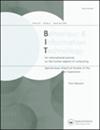Exploring and comparing pedagogical beliefs of university instructors in relation to their behavioural patterns regarding learning management system use
IF 3.1
4区 管理学
Q2 COMPUTER SCIENCE, CYBERNETICS
引用次数: 0
Abstract
Understanding the relationship between instructors’ pedagogical beliefs and their usage of learning management systems (LMSs) is crucial in higher education. This study addresses this research gap ...探索和比较大学教师的教学信念与他们使用学习管理系统的行为模式之间的关系
了解教师的教学信念与他们使用学习管理系统(LMS)之间的关系对高等教育至关重要。本研究针对这一研究空白 ...
本文章由计算机程序翻译,如有差异,请以英文原文为准。
求助全文
约1分钟内获得全文
求助全文
来源期刊

Behaviour & Information Technology
工程技术-计算机:控制论
CiteScore
7.70
自引率
8.10%
发文量
159
审稿时长
5 months
期刊介绍:
Behaviour & Information Technology (BIT) puts people before technology. As such it deviates from other related journals. It is the primary scientific venue for peer-reviewed publications on human-centred IT.
BIT reports original research studies, practical case studies, and thoughtful articles on:
• usability and user experience (UX)
• human computer interaction (HCI)
• human-centred and user-centred design
• the social, business and human aspects of the digital world.
The Journal attracts authors and readers from a variety of disciplines (e.g., usability, user experience, psychology, ergonomics, computer science, and sociology), originating from both academics and industry.
All papers are subject to initial appraisal by the Editor, and, if found suitable for further consideration, will undertake rigorous double blind peer review by independent, anonymous expert referees.
 求助内容:
求助内容: 应助结果提醒方式:
应助结果提醒方式:


